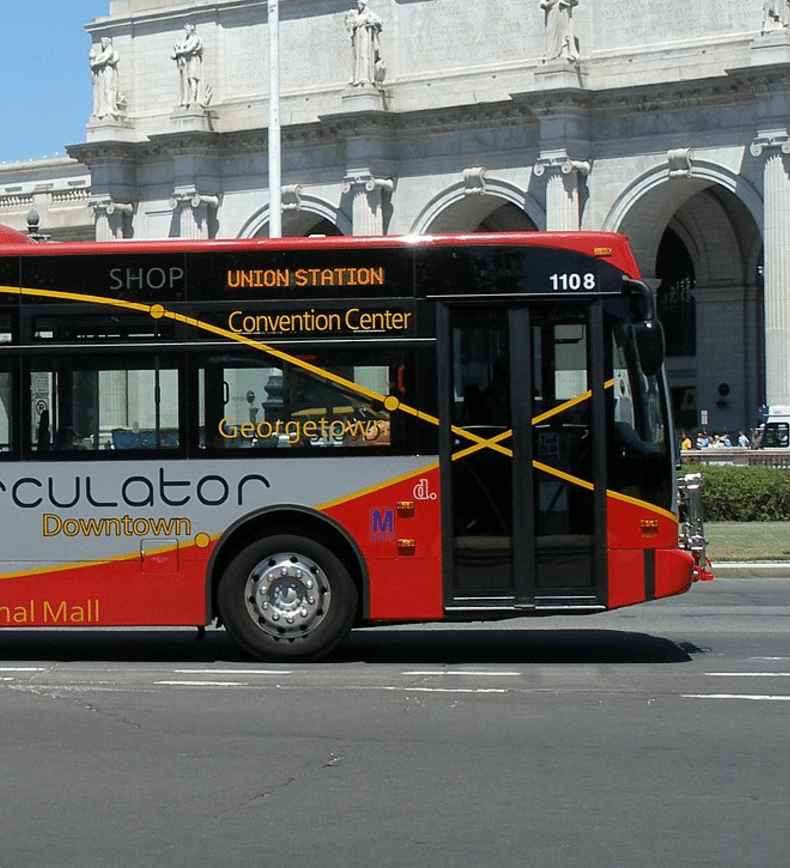Labor & Economy
Private Transit Contractors: Unsafe at Any Speed
A recent audit found that First Transit, the contractor hired by the city to operate the D.C. bus system, is cutting corners on maintenance.

Washington, D.C.’s public buses and privately operated bus system, D.C. Circulator, serve many of the same streets and stops, but what makes them different is crucial and, potentially, dangerous.
A recent audit found that First Transit, the contractor hired by the city to operate D.C. Circulator, is cutting corners on maintenance. Inspectors found issues with safety equipment, driver controls, brakes and loose lug nuts — posing dangers to riders, drivers and other vehicles on the road. There were an average of nearly three “serious safety defects” per bus, defects that “should render a bus out of service until repaired.”
As frightening as that sounds, we shouldn’t be surprised. First Transit’s performance shows the telltale signs of a contractor cutting corners to increase profits. Inspectors found that some maintenance technicians didn’t have required or industry standard licenses. Meanwhile, the system’s drivers are among the lowest-paid public transit operators in the Washington region, and driver turnover is high.
Unfortunately, D.C. Circulator isn’t an exception; it’s more like the rule. Last week, In the Public Interest released a report detailing the many ways government contractors across the country harm the public, workers and the environment in their pursuit of profit. Cutting Corners describes companies, like First Transit, that have reduced the quality and accessibility of services and lowered worker wages, and other companies that have sidestepped protections for the public and the environment.
Companies cut corners across a variety of public goods and services, often with tragic consequences. For example, in 2010, United Care, a company contracted by Los Angeles County to coordinate foster care, lowered standards for selecting foster parents to cut costs—as many as half of the company’s parents had a criminal record. In that same year, a 2-year-old child died after she was beaten by a United Care parent who had received multiple child abuse complaints.
Private companies continue to claim they deliver public services better, faster and cheaper. But as Cutting Corners shows, what they’re selling often turns out to be just the opposite.
(Photo by Coolcaesar)

-

 Column - State of InequalityJanuary 22, 2026
Column - State of InequalityJanuary 22, 2026On Eve of Strike, Kaiser Nurses Sound Alarm on Patient Care
-

 The SlickJanuary 20, 2026
The SlickJanuary 20, 2026The Rio Grande Was Once an Inviting River. It’s Now a Militarized Border.
-

 Latest NewsJanuary 21, 2026
Latest NewsJanuary 21, 2026Honduran Grandfather Who Died in ICE Custody Told Family He’d Felt Ill For Weeks
-

 The SlickJanuary 19, 2026
The SlickJanuary 19, 2026Seven Years on, New Mexico Still Hasn’t Codified Governor’s Climate Goals
-

 Latest NewsJanuary 22, 2026
Latest NewsJanuary 22, 2026‘A Fraudulent Scheme’: New Mexico Sues Texas Oil Companies for Walking Away From Their Leaking Wells
-

 The SlickJanuary 23, 2026
The SlickJanuary 23, 2026Yes, the Energy Transition Is Coming. But ‘Probably Not’ in Our Lifetime.
-

 The SlickJanuary 27, 2026
The SlickJanuary 27, 2026The One Big Beautiful Prediction: The Energy Transition Is Still Alive
-

 Column - State of InequalityJanuary 29, 2026
Column - State of InequalityJanuary 29, 2026Are California’s Billionaires Crying Wolf?

